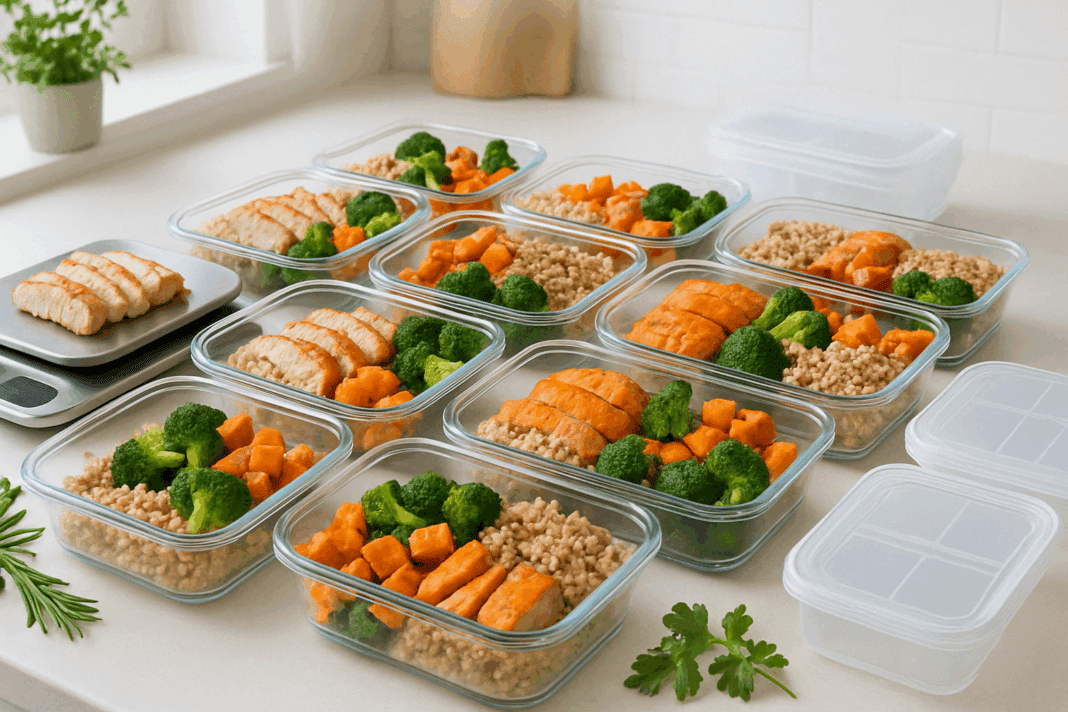In today’s fast-paced world, maintaining a healthy diet can feel like a daunting task, especially when you’re juggling work, family, and personal obligations. Yet, one of the most powerful strategies for staying on track with your health goals is deceptively simple: meal prepping. Smart meal prep ideas for weight loss can make all the difference between relying on unhealthy takeout and enjoying nourishing, home-cooked meals throughout the week. By planning ahead with easy, nutritious meals, you not only save time and money but also stay committed to a healthier lifestyle grounded in mindful eating and nutrition.
You may also like: Smart Meal Prep for Weight Loss: Expert-Approved Lunch Ideas and Recipes to Stay on Track
Meal prepping doesn’t have to be complicated or time-consuming. With the right approach, even those new to the concept can enjoy success. From easy meal prep ideas to advanced food prepping recipes designed for weight loss, the key lies in choosing nutrient-dense ingredients, preparing meals in batches, and storing them in a way that retains freshness and flavor. When executed with intention, meal prep becomes a tool that supports sustainable weight management and overall wellness.
Understanding the Science Behind Meal Prep and Weight Loss
To appreciate the benefits of meal prep for weight loss, it’s essential to understand the scientific principles that underlie it. Weight management hinges on consistent calorie control, nutrient timing, and balanced macronutrient intake. When you prepare your meals in advance, you gain control over portions, avoid impulsive eating, and make healthier choices effortlessly. This structured approach aligns perfectly with behavioral strategies supported by nutrition science, which show that self-monitoring and planning are two of the most effective tools for sustainable weight loss.
Moreover, healthy meal prep ideas reduce the mental load associated with daily meal decision-making, a concept known as decision fatigue. When you eliminate the need to constantly decide what to eat, you’re more likely to stick to your dietary plan. Evidence also shows that individuals who follow planned meals tend to have better adherence to dietary guidelines, reduced caloric intake, and improved metabolic markers.
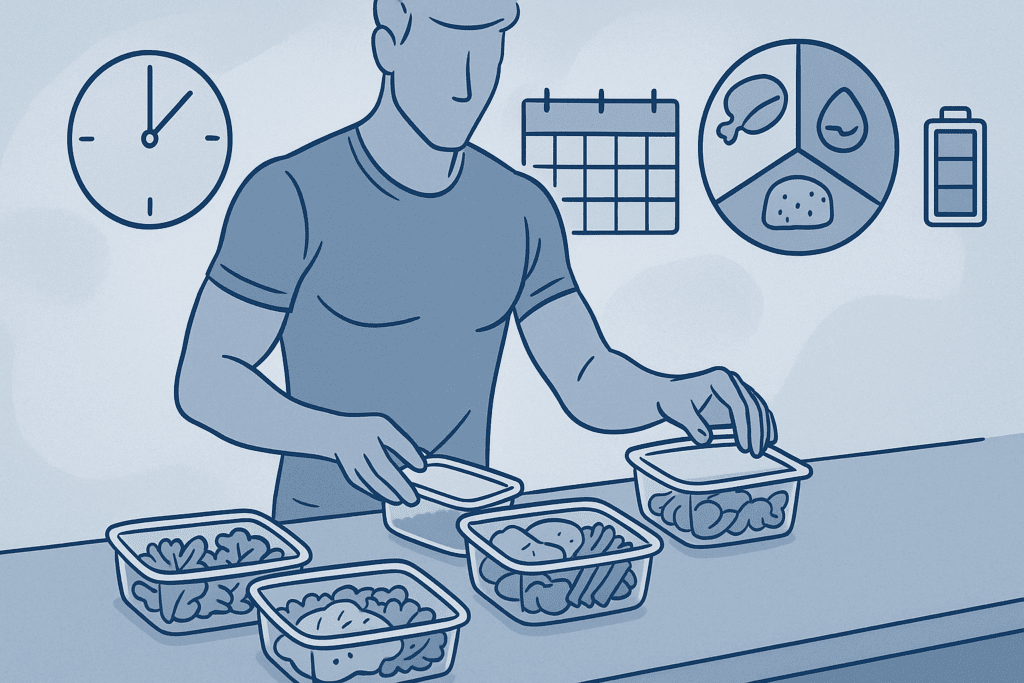
Balancing Macronutrients in Meal Prep Recipes for Weight Loss
When designing meal prep meals for weight loss, a fundamental component is macronutrient balance. This means including adequate protein, healthy fats, and complex carbohydrates in every meal. Protein is especially important as it helps preserve lean muscle mass during calorie restriction and increases satiety, helping you feel full longer. Some of the best meal prep recipes for weight loss feature lean proteins like grilled chicken, lentils, tofu, or hard-boiled eggs.
Complex carbohydrates from whole grains, legumes, and starchy vegetables provide sustained energy while delivering essential vitamins and minerals. Healthy fats such as avocado, nuts, and olive oil support hormone regulation and aid in the absorption of fat-soluble nutrients. The most effective meal prep dishes blend these macronutrients in proportions tailored to your unique energy needs, creating balanced meals that prevent energy crashes and cravings.
Incorporating high-fiber vegetables into your meal prep dinner recipes further enhances fullness and digestive health. Vegetables like broccoli, spinach, carrots, and bell peppers not only add flavor and texture but also increase the nutrient density of your meals without excess calories.
Easy Meal Prep Recipes for Busy Lifestyles
For many, the biggest barrier to meal prepping is the perceived time investment. However, with the right easy meal prep recipes, even the busiest individuals can prepare wholesome meals in under an hour. One popular strategy involves sheet pan dinners, where proteins and vegetables are cooked together on a single baking tray, minimizing cleanup while maximizing flavor.
Another accessible method is batch cooking soups, stews, or chili in a slow cooker or Instant Pot. These one-pot wonders can be divided into multiple portions and stored for the week ahead. Salad jars, layered with grains, vegetables, proteins, and dressings, are also excellent easy meal prep ideas that stay fresh and crisp when properly sealed. Additionally, meal prep foods like overnight oats or Greek yogurt parfaits provide quick, high-protein breakfast options that can be made several days in advance.
If you’re looking for good meal prep recipes that save time, consider investing in quality storage containers. Divided glass or BPA-free plastic containers make portioning effortless and help preserve food texture and flavor. When meals are visually appealing and easy to grab, you’re far more likely to stay consistent with your healthy eating goals.
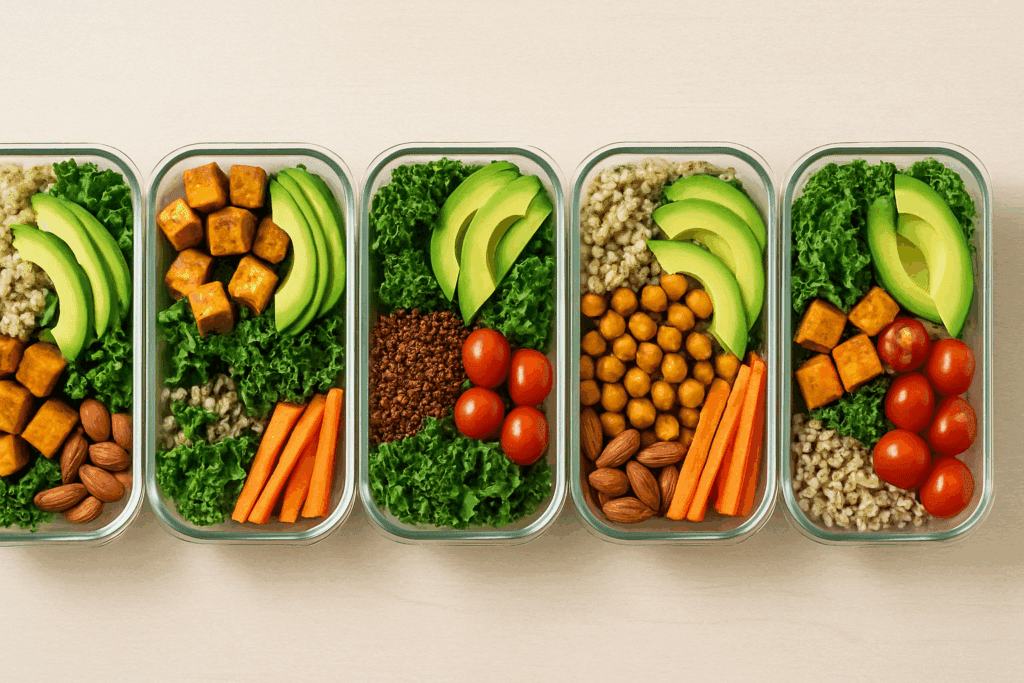
Meal Prep Ideas for Weight Loss That Support Satiety and Metabolism
Effective meal prep for weight loss goes beyond calories. It’s about creating meals that keep you satisfied and energized. To do this, prioritize ingredients with a high thermic effect, such as lean proteins, which require more energy to digest and metabolize. Adding spices like chili powder, turmeric, or cumin to your prep recipes can also gently increase metabolic rate while enhancing taste.
Hydration plays a vital role in supporting weight loss, so be sure to include hydrating foods such as cucumbers, zucchini, and citrus fruits. These not only add volume to meals without excess calories but also contribute to better digestion and overall metabolic function. Fiber-rich foods like quinoa, black beans, and Brussels sprouts further promote satiety and support healthy blood sugar levels.
Meal prep dinner ideas that are rich in fiber and protein may help reduce nighttime cravings, a common pitfall for those trying to lose weight. Including healthy fats like chia seeds or flax in your easy food prep ideas for breakfast or snacks can also stabilize energy and reduce hunger between meals.
The Role of Meal Prepping in Long-Term Dietary Adherence
One of the often-overlooked benefits of meal prep dinners is the consistency they foster. When your meals are prepared in advance, you’re less likely to stray from your goals due to convenience-based temptations. This can be especially helpful for individuals navigating specific dietary patterns, such as choosing between a ketogenic diet vs low carb alternatives.
There’s often confusion between the terms low carb diet keto diet and more moderate carb eating styles. While a low carb diet may limit carbohydrates to 50–150 grams per day, the ketogenic approach reduces this even further to 20–50 grams to induce a state of ketosis. Understanding the difference in the keto diet vs low carb diet framework is essential when planning your food prep ideas. For instance, meal prep recipes for weight loss under a keto plan would emphasize fatty cuts of meat, cheese, and non-starchy vegetables, while a standard low carb meal might still include legumes or whole grains.
Meal prepping supports these individualized plans by allowing you to plan and portion according to your specific goals. Whether you’re following a keto plan or simply reducing refined carbs, the structure provided by prepping makes it easier to meet macronutrient targets without the stress of constant decision-making.
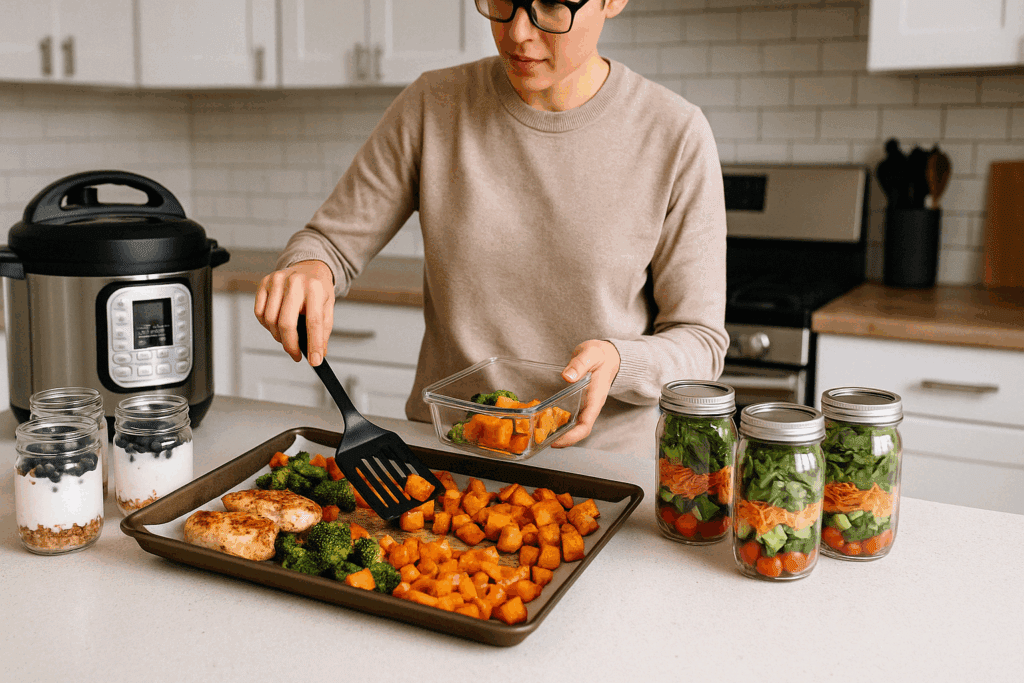
Is a Keto Diet Sustainable in Meal Prep Plans?
As the popularity of low-carb eating rises, many ask, “Is keto a good diet for long-term weight loss?” or “Is a keto diet sustainable for busy individuals?” The answer depends on how well the plan aligns with your lifestyle and how it’s implemented. When done mindfully with diverse, nutrient-dense ingredients, keto can be a part of a healthy eating strategy. However, it’s not necessarily suitable for everyone.
Meal prep meals tailored to keto principles often include eggs, salmon, cheese, avocado, and leafy greens. These ingredients are not only filling but also rich in essential micronutrients. For those who prefer easy dinner meal prep, keto options like cauliflower rice stir-fry, zucchini lasagna, or turkey meatballs with leafy greens can provide variety and satisfaction.
Still, it’s important to remember that sustainability depends on dietary flexibility and nutritional adequacy. While is keto no carbs a commonly searched phrase, it’s a misconception. Even ketogenic diets include small amounts of carbohydrates from vegetables and nuts. A rigid no-carb approach can lead to nutrient deficiencies and burnout. So if you’re exploring whether a keto or low-carb diet works for you, it’s wise to use meal prepping as a method to trial different styles while maintaining balance.
Delicious Meal Prep Ideas That Encourage Lifestyle Changes
Lasting weight loss is about more than just calories and macros—it’s about cultivating habits that align with your lifestyle. Delicious meal prep ideas that excite your taste buds while satisfying your hunger are key to making those habits stick. Rotating your recipes weekly prevents boredom and introduces a wider range of nutrients.
Incorporating global flavors into your prep recipes—like Mediterranean chickpea bowls, Thai peanut noodles with tofu, or Moroccan lentil stew—can keep meals exciting without relying on processed sauces or additives. Simple meal prep dishes that feature vibrant produce and lean proteins can be prepared in advance and easily adjusted to fit your preferences.
For example, switching up your meal prep dinner recipes with seasonal ingredients keeps your body aligned with natural food rhythms and supports immune health. Using herbs, citrus, vinegars, and spices instead of excess salt or sugar also enhances flavor while supporting your weight loss journey.
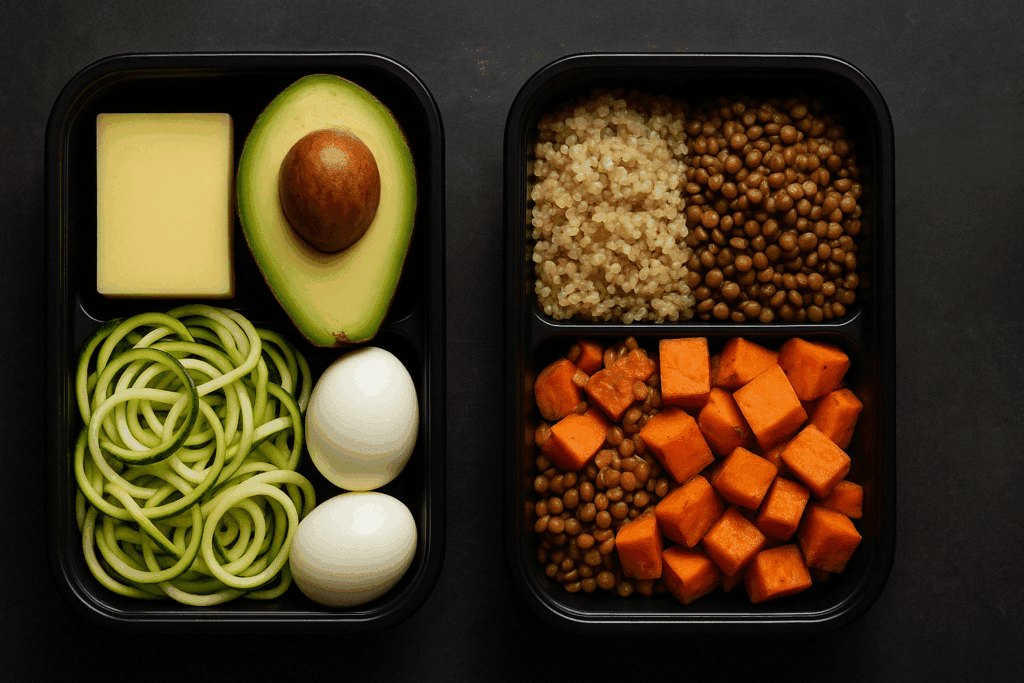
Creating a System That Works: Tools, Storage, and Scheduling
Building an effective meal prep system requires more than just good intentions. It involves setting aside time weekly to plan, shop, cook, and store. Many find success by designating Sundays or another consistent day for meal prepping. Choosing a few base ingredients—like roasted vegetables, grilled protein, and a whole grain—allows for mix-and-match meal prep meals throughout the week.
Invest in tools like a high-quality chef’s knife, meal prep containers with airtight seals, and a reliable cutting board. Having these essentials makes the process smoother and more enjoyable. Labeling your containers with dates also helps with freshness and safety. Additionally, using a digital meal planning app can streamline your shopping list and recipe organization, ensuring your easy meal prep recipes align with your nutritional targets.
Meal prep dishes can also include snacks, not just full meals. Pre-portioned trail mix, hummus with veggie sticks, or boiled eggs provide quick, nutritious options when hunger strikes. Having these prepared in advance reinforces healthy choices and prevents impulse eating.
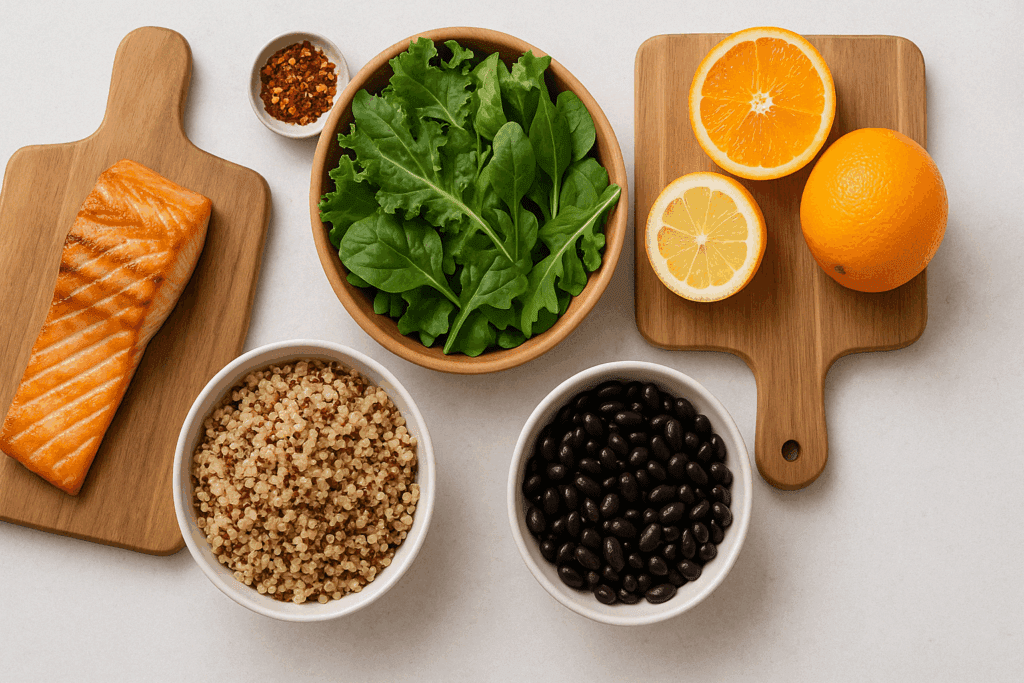
Frequently Asked Questions: Smart Meal Prep Ideas for Weight Loss
1. How can I customize healthy meal prep ideas to suit food allergies or intolerances?
Customizing healthy meal prep ideas for allergies or intolerances starts with understanding safe ingredient swaps. For example, if you’re sensitive to gluten, quinoa or brown rice make great alternatives to wheat-based grains in your meal prep recipes. Those avoiding dairy can use unsweetened almond yogurt or cashew cheese in easy meal prep meals. It’s also helpful to batch-prepare sauces, like tahini or avocado-based dressings, that eliminate common allergens while enhancing flavor. Ultimately, allergy-friendly food prep ideas require a proactive approach to label reading and ingredient control, something meal prepping naturally encourages.
2. What are the psychological benefits of sticking to a simple meal prep routine?
Engaging in simple meal prep not only supports physical health but also fosters emotional well-being by reducing stress, enhancing mindfulness, and promoting self-efficacy. Following a consistent dinner meal prep routine can decrease anxiety around food decisions and improve your sense of control over eating habits. Additionally, successful completion of weekly meal prep meals reinforces goal-setting behavior, which can ripple into other areas of your life. Easy dinner meal prep, especially when paired with satisfying and nourishing ingredients, may even reduce emotional eating by eliminating reactive food choices. Over time, this strengthens a more balanced, self-compassionate relationship with food.
3. Can meal prep help with portion control even without counting calories?
Yes, meal prep for weight loss is incredibly effective for portion control, even without meticulous calorie tracking. Pre-portioned containers help prevent overeating by creating visual boundaries and removing the need for spontaneous decisions. Good meal prep recipes often incorporate balanced ratios of protein, complex carbs, and healthy fats, which naturally create satiety and help regulate hunger hormones. By following best meal prep recipes that emphasize whole foods, it becomes easier to tune into natural fullness cues rather than relying on numbers. This approach supports intuitive eating within a structured framework, empowering sustainable weight management.
4. How do I make meal prep dinners more exciting without sacrificing health?
To keep meal prep dinners enjoyable, focus on culinary variety and flavor layering rather than excess calories or sodium. Use global spices, fresh herbs, and citrus to add complexity to your meal prep dishes without relying on butter or sugar. Rotating through diverse easy meal prep recipes—such as Moroccan chickpea bowls or Thai-inspired turkey lettuce wraps—prevents flavor fatigue and keeps your palate engaged. Additionally, switching up textures with crispy vegetables, roasted seeds, or creamy dressings creates more satisfying dining experiences. Delicious meal prep ideas thrive on creativity and fresh seasonal ingredients that keep meals both interesting and nutritious.
5. What tools or gadgets can make food prepping recipes more efficient?
Investing in a few key tools can dramatically streamline your dinner prep ideas. A sharp chef’s knife, quality cutting board, and food processor will speed up chopping, blending, and slicing. Using an air fryer or Instant Pot can cut down on cook time and expand your options for easy food prep ideas like crispy tofu or tender stews. Divided glass containers and meal prep-specific portion trays help organize your refrigerator and simplify serving. Digital timers and kitchen scales also add consistency when following good meal prep recipes that require precision. These gadgets elevate your workflow, making healthy meal prep ideas both fun and sustainable.
6. Are there ways to make easy meal prep ideas more budget-friendly?
Absolutely—affordable meal prep starts with pantry planning and bulk cooking. Incorporate inexpensive, nutrient-dense ingredients like lentils, oats, cabbage, and frozen vegetables into your easy meal prep meals. Buying proteins and grains in bulk and freezing portions ensures you always have building blocks for healthy, last-minute prep recipes. Utilizing leftover ingredients creatively—such as turning roasted veggies into wraps or soups—reduces waste and cost. Many of the best meal prep meals stem from versatile, multipurpose components that work across several dishes, helping your budget stretch further without compromising health.
7. How can I avoid boredom with my weekly meal prep meals?
Variety is essential in long-term dinner meal prep success. Create theme weeks based on different cuisines—such as Mediterranean, Asian, or Latin-inspired—to diversify your healthy meal prep recipes for weight loss. Swap core ingredients while keeping similar meal structures, such as rotating between different protein sources like tempeh, chicken, or eggs in your meal prep dinner recipes. Consider using sauces or marinades as flavor anchors that can transform the same base ingredients into new experiences. Even small tweaks—like switching from roasted to raw vegetables or adding seasonal fruits—can breathe new life into your regular food prepping recipes.
8. How do I transition from takeout to consistent home-cooked meal prep meals?
Start by identifying your favorite takeout dishes and then replicate them using healthy meal prep ideas tailored to your nutrition goals. Recreate comfort foods—like burrito bowls or stir-fries—using whole ingredients and lower-sodium seasonings. Batch-cooking sauces and freezing them in small portions makes assembling easy meal prep recipes much quicker on busy nights. Gradually replace a few takeout meals per week with simple meal prep alternatives that still deliver flavor and satisfaction. Over time, this shift supports better health outcomes and builds confidence in your kitchen skills, making home-cooked meal prep dishes your preferred choice.
9. Can meal prep ideas for weight loss also support muscle gain and athletic goals?
Yes—many meal prep ideas for weight loss also align with muscle-building and performance nutrition when slightly modified. Emphasizing protein-rich prep recipes like grilled salmon, quinoa bowls, or tofu stir-fries can support muscle repair and growth. Adding complex carbs such as sweet potatoes and whole grains helps replenish glycogen stores for endurance and strength training. You can scale portions of meal prep foods based on workout days versus rest days for better nutrient timing. Meal prep dinners designed for recovery—complete with lean proteins and anti-inflammatory vegetables—support both body composition and athletic performance goals.
10. What’s the long-term impact of incorporating dinner prep ideas into my weekly routine?
Building a habit of dinner prep ideas yields significant long-term benefits for health, time management, and financial savings. Over months and years, consistent meal prep supports stable blood sugar, weight regulation, and nutrient adequacy. It also reinforces positive behaviors around cooking, planning, and prioritizing wellness in a sustainable way. As your skills and confidence grow, experimenting with more advanced or creative meal prep dinner ideas becomes second nature. Ultimately, these lifestyle changes ripple into other areas of health and productivity, showing that good meal prep ideas are not just about food—they’re foundational to a more mindful, empowered way of living.

Reflecting on the Benefits: A Sustainable Path to Wellness
Smart meal prep ideas for weight loss represent more than just a cooking strategy—they embody a commitment to intentional living, where food is a source of nourishment rather than stress. Through thoughtful planning, diverse meal prep recipes, and a focus on nutrition, individuals can create routines that support both weight loss and long-term health.
When considering dietary choices, the debate around ketogenic diet vs low carb styles often centers on sustainability and nutrient balance. Understanding that is keto a low carb diet is not a binary question, but rather part of a spectrum, allows for greater flexibility in tailoring meal plans. Similarly, asking is keto a good diet or is a keto diet sustainable should involve evaluating how these plans affect your energy, mood, and adherence over time.
Ultimately, the most effective meal prep ideas are those that you enjoy, that align with your values, and that you can maintain consistently. Whether you’re exploring meal prep dinners for a low-carb approach or preparing the best meal prep recipes for plant-based eating, the principles of mindful eating and balanced nutrition remain your foundation. By adopting a strategic, enjoyable approach to food prepping recipes, you empower yourself to build habits that nourish both body and mind—today, and for the long run.
Was this article helpful? Don’t let it stop with you. Share it right now with someone who needs to see it—whether it’s a friend, a colleague, or your whole network. And if staying ahead on this topic matters to you, subscribe to this publication for the most up-to-date information. You’ll get the latest insights delivered straight to you—no searching, no missing out.
Further Reading:
26 Weight-Loss Recipes for Beginners
Meal Prep for Weight Loss: Easy and Healthy Recipes for Effective Results

